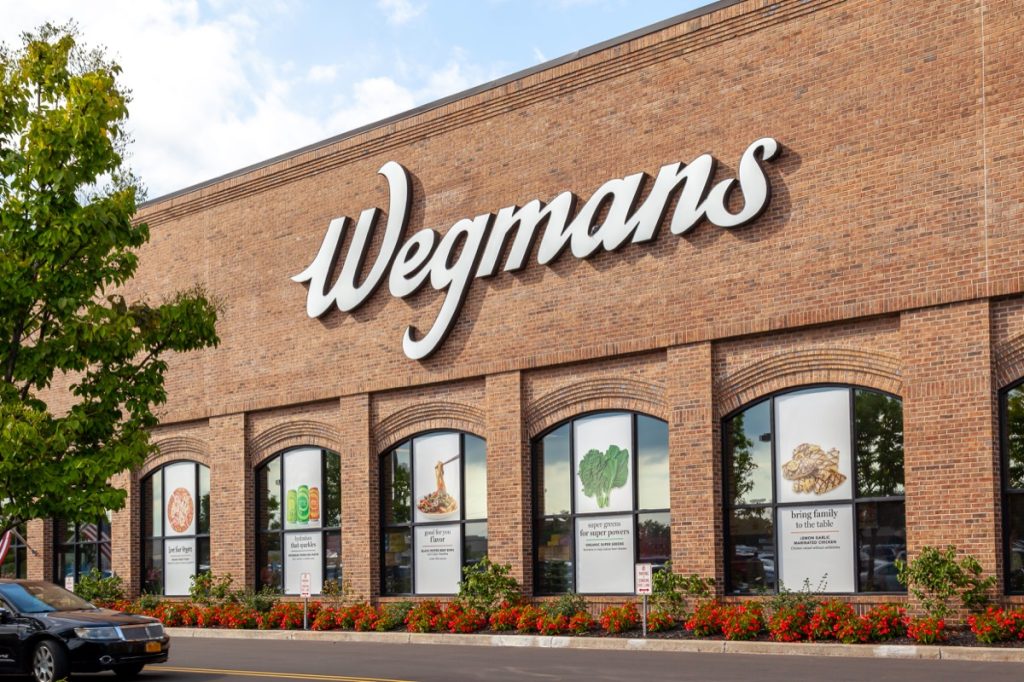USDA Issues Public Health Alert for Chicken Products Sold at Wegmans and Other Grocers

Shopping at the supermarket can sometimes feel like an overwhelming experience due to the number of items on the shelves and in the coolers. Still, customers can peruse aisles with the confidence that the things they’re purchasing are safe to consume thanks to the food safety regulatory system in place. But while strict rules and inspections can go a long way in keeping potentially dangerous products off the market, some items are only discovered to be unsafe after they’ve been distributed to stores and sold to customers. And now, the U.S. Department of Agriculture (USDA) has issued a public health alert for chicken products sold at Wegmans and other major grocers. Read on to see which items are affected and what you should do if you have them in your kitchen.
READ THIS NEXT: Thyroid Medication Recalled, FDA Says in New Warning.
The USDA issued an alert for a frozen chicken item sold at Wegmans stores.

On Feb. 3, the USDA’s Food Safety & Inspection Service (FSIS) announced it had issued a public health alert for frozen chicken products sold at Wegman’s grocery stores. The agency says the affected item is labeled as Wegmans Chicken Korma with Basmati Turmeric Rice and is packaged in 10-ounce containers printed with the best-by date “08 NOV 2023.”
The notice states that the products were shipped to Wegmans locations in New York and Pennsylvania. Affected items will also have the establishment number “P-34641” inside the USDA mark of inspection.
The agency says that it issued the public health alert after discovering a labeling mix-up thanks to customer complaints, in which the product labeled as chicken korma actually contained vegetable tikka masala. The error means that the affected items have cashews as an ingredient not declared on the label, which is a known food allergen that can cause severe reactions in certain people.
A second health alert warns a chicken item sold at grocers in five states poses a potential health risk.

On the same day, FSIS released another poultry-related public health alert for a ready-to-eat (RTE) stuffed chicken item produced by North Carolina-based Vanguard Culinary Group. According to the agency’s notice, the affected item is labeled as “Park Street Deli Broccoli Stuffed Chicken Boneless Skinless Chicken Breast Hand Stuffed with Broccoli & Cheddar Au Gratin” packaged in 16-ounce vacuum-sealed trays.
The products are also marked with a use-by date of Jan. 30, 2023, and the establishment number “P-8334” inside the USDA seal of inspection. The agency said the affected item was sent to retail locations in Alabama, Florida, New York, Pennsylvania, and Virginia.
FSIS says it discovered that the product—which is advertised as fully cooked—may be raw and unfit for consumption. The agency became aware of the issue after it received complaints from customers.
RELATED: For more up-to-date information, sign up for our daily newsletter.
Here’s what you should do if you purchased either of the affected chicken items.

In both cases, FSIS says it didn’t issue a recall because the items were no longer available for purchase at stores due to their shelf sell-by dates. However, the agency is concerned that consumers may still have the items in their refrigerators or freezers at home.
According to the agency’s announcements, no adverse reactions or medical issues have been reported by anyone who has consumed either of the products. However, the agency urges anyone who feels they may be ill to contact their doctor or healthcare provider immediately.
Anyone who purchased either of the affected items should also not consume them and instead throw them away or return them to their place of purchase. Customers with questions or concerns can also reach the respective companies by phone or email using the contact information listed on the notices.
There have been other recent food safety issues that have resulted in recalls.

The USDA’s two public health alerts are just the latest examples of the food safety system in action. But other recent incidents have also resulted in recalls over potential health and safety risks.
On Jan. 28, the FDA announced that Sovos Brands Intermediate, Inc. had voluntarily recalled specific lots of its Rao’s Made for Home Slow Simmered Soup, Chicken & Gnocchi. According to the agency’s notice, affected products were shipped to retail locations in 32 states, including more than 4,000 Walmart stores. Similar to the Wegmans Chicken Korma alert, the FDA reported that the company issued the recall after it discovered a mistake during packaging meant that jars labeled as Chicken & Gnocchi actually contained vegetable minestrone. This created an issue where the product contained undeclared egg as an ingredient, creating a potential health hazard for some customers.
The FDA then announced on Jan. 31 that Conagra Brands, Inc. had initiated a recall for about 2,581,816 pounds of canned meat and poultry products from stores. The agency posted a list of 63 affected items—including Vienna sausage and potted meat sold under nine different brand names—warning they might be affected by a packaging defect “that is not readily apparent to consumers, which may allow foodborne pathogens to enter the cans.”
And on Feb. 3, the FDA announced a recall from Maryland-based Fresh Ideation Food Group affecting more than 400 ready-to-eat products ranging from breakfast sandwiches and noodle bowls to salads and snacks. The company said the items had been shipped to nine states and were sold in stores, vending machines, and during travel with transportation providers, including Amtrak. In this case, Fresh Ideation decided to pull the items because they could be contaminated with harmful Listeria monocytogenes bacteria.